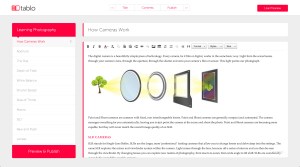Getting a book published used to require something called “an agent” who talked to a “publishing house” who, in turn, hired a “printer” to make a “hardback” or “paperback” version of your words. Tablo.io is just another in the long line of startups aimed at relegating those things to the deep, dark past.
Tablo is an Australian company founded by Ash Davies and Andrew McIntosh, two design hackers who wanted to grab a piece of the epub pie. Their product has been funded to the tune of $20,000 by Australian accelerator Angelcube.
There are two publishing methods: you can cut and paste your chapters one at a time into the WYSIWYG interface or simply upload iBooks-compatible epub files. The system then makes them available in your web browser or, for an extra fee, in the Amazon and iBooks bookstores. The company saw $12,000 in revenue in its first month after launch and they have 150 authors from 30 countries signed up for the service.
“Creating a book with Tablo is like creating a blog post with WordPress. You can create your book in the cloud with full control over your design, media and content,” said Davies. “You can preview your books in the browser, collaborate with editors or friends and publish to bookstores with a single click.”
The service also lets you embed books onto websites and you can read them on any mobile browser.
“Publishing my own eBook sucked – it took me months to wrestle with book conversions, file formats and publishing contracts,” said Davies. “As a blogger I was so used to being able to type something and click publish, but nothing like this existed in the eBook world.”
The company is ramping up its U.S. presence and is looking for local funding. Because both of the creators are designers, the whole thing has a simple, WordPress-esque feel to it, similar to sites like pressbooks.com, allowing bloggers and other online media ninjas to build books without all the old-fashioned clutter of “book stores” and “editors.”


